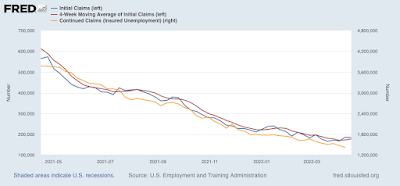Jobless claims: more 50+ year lows Initial jobless claims declined -2,000 to 184,000, another 50+ year low. The 4 week average rose from 4,500 to 177,250, compared with the all-time low of 170,500 set two weeks ago. Continuing claims declined -58,000 this week to 1,417,000, a new 50 year low (but still well above their 1968 all-time low of 988,000): Nobody – still – is getting laid off. We’re still about 1.6 million shy of “full employment,” by my calculation. Further, the game of “musical chairs” whereby workers can always find higher wages somewhere is still very much happening. The next important marker is going to be “job openings” in the March JOLTS report which will be released next week. That’s because this situation is going
Topics:
NewDealdemocrat considers the following as important: jobless claims, US EConomics
This could be interesting, too:
NewDealdemocrat writes JOLTS revisions from Yesterday’s Report
Bill Haskell writes The North American Automobile Industry Waits for Trump and the Gov. to Act
Bill Haskell writes Families Struggle Paying for Child Care While Working
Joel Eissenberg writes Time for Senate Dems to stand up against Trump/Musk
Jobless claims: more 50+ year lows
Initial jobless claims declined -2,000 to 184,000, another 50+ year low. The 4 week average rose from 4,500 to 177,250, compared with the all-time low of 170,500 set two weeks ago. Continuing claims declined -58,000 this week to 1,417,000, a new 50 year low (but still well above their 1968 all-time low of 988,000):

Nobody – still – is getting laid off. We’re still about 1.6 million shy of “full employment,” by my calculation. Further, the game of “musical chairs” whereby workers can always find higher wages somewhere is still very much happening.
The next important marker is going to be “job openings” in the March JOLTS report which will be released next week. That’s because this situation is going to go on until enough employers decide that they simply can’t afford the higher wages demanded, or because increased prices have cooled off demand enough that they can get by without hiring more workers.
